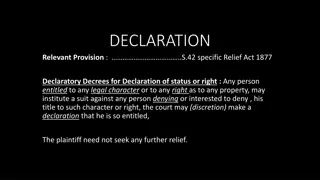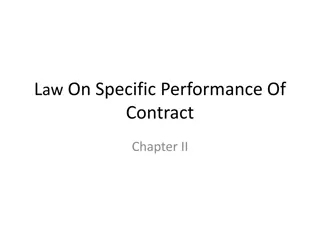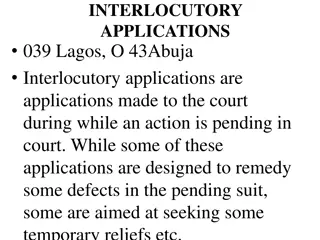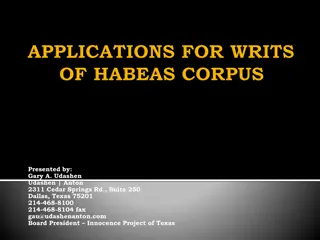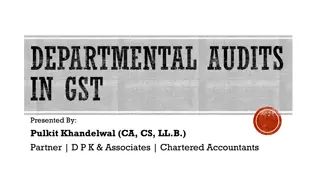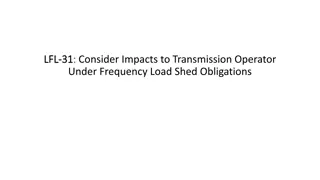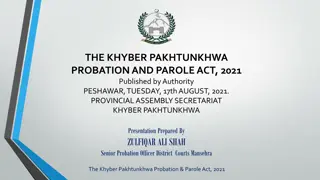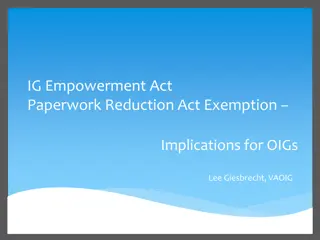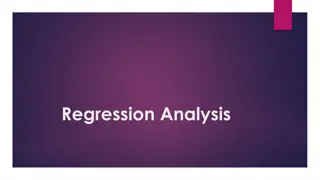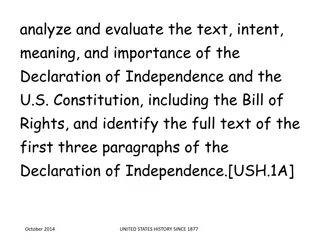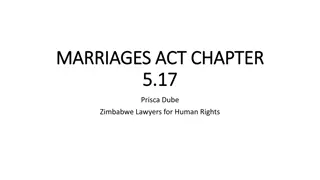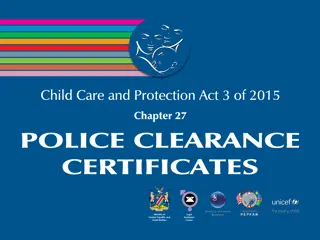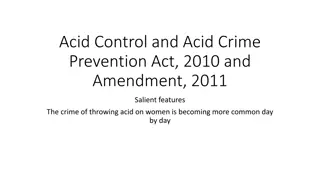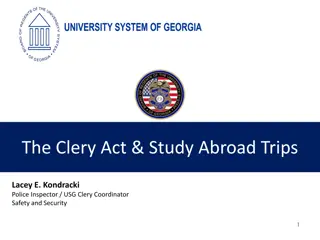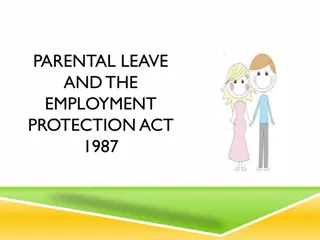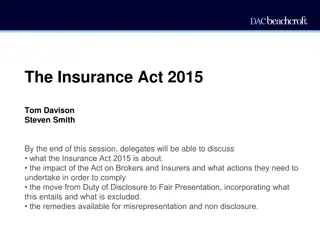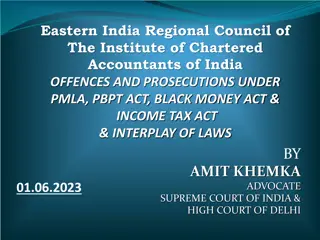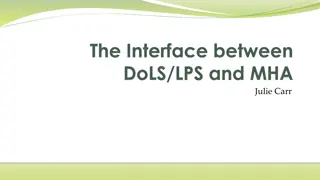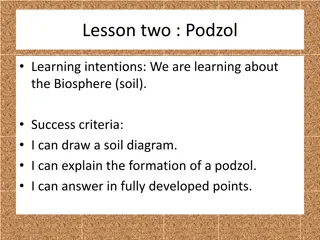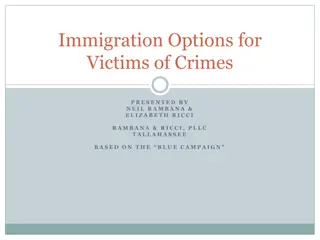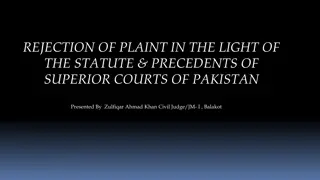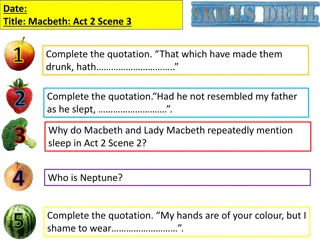Specific Reliefs under the Specific Relief Act, 1877
The Specific Relief Act, 1877 provides various ways to give specific reliefs, including taking possession, ordering obligations, abstaining from acts, declarations, and appointing receivers. It covers the recovery of immovable and movable property, with specific procedures outlined. The Act allows for seeking possession and addresses dispossession issues. Historical overviews and the evolution of justice delivery systems are also discussed.
Download Presentation

Please find below an Image/Link to download the presentation.
The content on the website is provided AS IS for your information and personal use only. It may not be sold, licensed, or shared on other websites without obtaining consent from the author. Download presentation by click this link. If you encounter any issues during the download, it is possible that the publisher has removed the file from their server.
E N D
Presentation Transcript
How specific Reliefs are Given under Specific Relief Act, 1877?
Specific Relief Act, 1877 Historical Overview 1. Era of Anglo-Saxons (Before 1066) No formal Legislature, executive and Judicial Structure. Country was divided into small units named Hundreds. Reeves use to be the Head of each unit. Witans (The Assembly of Nobles) use to play an important role in National decision making.
Era of Normans (1066 onwards) Invasion of William Duke and defeating the King Harold. Era of Development of Common Law formally. Types of Reliefs in Common Law Punitive Relief Compensatory Relief Exemplary Relief Emerging of New issues not Covered by Common Law Everet Vs William Case Emerging of Interim Injunction
Dispensation of Justice by the Crown, Lord Chancellor and Sub Chancellors. Formal formulation of Chancery Courts. Evolution of Maxims of Equity. Judicature Acts of 1873 and 1875.
Specific Reliefs How Given under Specific Relief Act, 1877 (Section 5) By taking possession and delivering to the Claimant (Section 8-11). By ordering to do an obligation(Section 55). By ordering to abstain from doing an act when non-performance of obligatory(Section 52-53). By Declaration (Section 42-43). By Appointment of Receiver (Section 44). such act is
1. Recovery of Possession of Property Types of Recovery i. Recovery of Possession of immovable property (Section 8 and 9). ii. Recovery of Possession of movable property (Section 10 and 11).
Recovery of Possession of immovable property under section 8 The Court has the discretion to grant possession, when a person has legal title to that specific immovable property. Procedure of Code of Civil Procedure is followed. Limitation: 12 Years under Section 142 of Limitation Act.
Suit Against Dispossession under Section 9 The Court has the possession, when a person is dispossessed otherwise in due course of law. Title to that specific immovable property is not essential. Such suit cannot bar suit for recovery of possession. No such suit can be instituted against Federal or Provincial Government. No right to Appeal or Revision against any order or decree under section 9. discretion to grant
Recovery of Specific Movable Property under Section 10 The Court has the discretion to grant possession, when a person is entitled to that specific property. Procedure of Code of Civil Procedure is followed. Conditions under which a person may be compelled to deliver specific movable property to other When the possessor is the agent of the claimant. When compensation in money is not an adequate relief. When damage cannot be estimated in terms of money When possession has been wrongfully transferred.
Injunction (Section 52-57) Definition Injunction is a discretionary order by the Court to do or not to do an act. Types of Injunction Preventive Injunction ii. Mandatory Injunction Preventive Injunction (Section 52) Court has discretion to grant preventive injunction under specific circumstances. Discretion : PLD 1991 SC 14 i.
Modes of Preventive Injunction (Section 53) There are two modes of preventive injunction i. Temporary Injunction ii. Perpetual Injunction Temporary Injunction Court may order to abstain from doing an act till specific time or further order. Procedure of Code of Civil Procedure is followed (Order 39). Ingredients of Temporary Injunction Prima Facie Case. Balance of Convenience. Irreparable loss.
Perpetual Injunction The Court has Discretion to grant perpetual Injunction only through a decree on the merits of the suit. Grounds of Perpetual Injunction (Section 54) When the defendant is a trustee of the property for the plaintiff. When actual damage cannot be ascertained. When pecuniary compensation adequate relief. When it is probable that pecuniary compensation cannot be gotten. When it seems necessary to prevent multiplicity of suits. is not an
Mandatory Injunction (Section 55) Court has discretion performance of an act when such performance is necessary to prevent the breach of an obligation. Conditions under which Injunctions may be refused (Section 56) To stay a judicial proceedings unless such restrain is necessary to prevent multiplicity of suits. To stay proceedings in the Court not subordinate to that from which injunction is sought. To interfere with public duties of the Federal or Provincial Governments. To stay proceedings in Criminal Matters. The to compel the
To prevent the breach of contract which cannot be specifically enforced. To prevent an act on the ground of nuisance, when it is not clear that it is nuisance. To prevent a continuing breach, when the applicant has acquiesced. When equally efficacious relief can be obtained. When the conduct of the applicant itself disentitle him. When the applicant has no personal interest.
Declaration (Section 42) The Court has discretion of declaring any title or legal character of a person when any other person is denying it or interested in any such denial. Any further relief should not be claimed with declaration if it is not needed. When the plaintiff is able to seek any further relief and he omits it the Court shall not grant Declaration. (Proviso of Section 42) Declaration is binding on the parties to suit.
Title A person is said to be entitled to any property when he has right to that property. Right Salmond s Elucidation Right is an interest, recognized and protected by law. Holland s Elucidation Right is the capacity of a person by virtue of which he may influence the acts of others by assent and assistance of the State. Vested Right PLD 1997 Peshawar 166 Vested right is something more than mere right, it is particularly creation of statute.
Legal Character Definition Status or position of a person in a given society is said to be legal character. AIR 1940 Cal 255 A man s character is something which defines his position in relation to the rest of the world. AIR 1931 Mad 441 Legal character is something equitant to status, something more than mere right. 2008 CLC 960 Legal Character is constituted by the attributes which the law attaches to a person in his individual or incapacities.
PLD 1978 L 113 No suits to be instituted only to satisfy one s ego against another person. Section 42 cannot be invoked to declare any title or character on the basis of mere sentiments. Courts can only enforce legal title or character under section 42 of Specific relief Act.
Appointment of Receivers (Section 44) Receiver A Receiver is defined to be an indifferent person between the parties, appointed by the Court to receive rents, incomes and profits of lands or other things in question, till the disposal of the suit, when it does not seem reasonable to the Court that either party could do it or when the party is incompetent to do so for instance an infant. The Court has discretion to appoint Receiver, till pendency of the suit. Purpose of appointment of Receiver is to provide safety of the property in dispute, till disposal of the suit. Code of Civil Procedure regulates the mode of appointment, rights and duties of the Receiver (Order 40 Rule 1-5).
Difference between Appointment of Receiver under CPC and that under Specific Relief Act Under Section 44 of Specific Relief Act, the Court has discretion to appoint Receiver, till the disposal of the suit. CPC provides about the appointment of Receiver for any property either before or after decree. Section 44 does not provides about the appointment Receiver for the property under Attachment in execution of Decree but CPC provides it.
Other Reliefs Under Specific Relief Act i. Rectification of Instruments (Section 31-34). ii. Recession of Contracts (Section 35-38). iii. Cancellation of Instruments (Section 39-41). iv. Specific Performance of Contracts (Section 12-30).
Rectification of Instruments (Section 31-34) The Court has discretion to rectify any contract or instrument in writing when by fraud or mutual mistake it does not truly depict the intention. Rights acquired by the third party in good faith for consideration shall not be prejudiced. The Court may inquire the purpose, meaning or consequence of the contract or instrument (Section 33). The Court must be satisfied that neither of the parties had malicious intent (Section 32). If specific performance of contract is also prayed for then that may also be granted after rectification (Section 34).
Recession of Contracts (Section 35-38) On application of either party to the contract the Court may grant the recession (partially or fully, as the justice requires), on the basis of following grounds: (Section 35): When the contract is voidable at the option of the plaintiff. ii. When the contract is unlawful for the non apparent cause and the error of the defendant seems more than the plaintiff. iii. When the decree of specific performance is made and the decree holder defaults. iv. In case of mistake but the party against whom recession is made must be restored to his position before the contract (Section 36). i.
Recession may be claimed an alternative relieve in suit for specific performance of contract (Section 37). Court may require the party rescinding the contract to do equity.
Cancellation of Instruments (Section 39-41) Court has the discretion to cancel any instrument (partially or fully, as the justice requires), in following situations: When an instrument is void or voidable against any person. When there is an apprehension of the misuse such instrument.
In such suits the Court may order the plaintiff to compensate the other party, if needed (Section 41). If the instrument was registered the Court shall send a copy of the decree to the Registration officer.
Specific Performance of Contracts (Section 12- 30) Court has discretion to enforce a contract specifically under following conditions: When there is no standard to ascertain the damage caused by the non-performance of contract. When pecuniary compensation is not an adequate relief. iii. When there is probability compensation cannot be got for non performance of the contract. Presumption Regarding Transfer of Immovable Property Court shall presume that compensation is not appropriate relief for the breach of contract to transfer immovable property proved. i. ii. that pecuniary unless otherwise
In certain exceptional circumstances the Court may order a partial contract to be performed specifically (Section 13- 16). Any party, seeking specific performance of a contract may also claim compensation for the breach of contract or as an alternative relief ( Section 19). A contract may be ordered to be performed specifically even when the sum of money to be paid in case of any breach, is mentioned in it (Section 20).
Contracts which cannot be specifically performed (Section 21) Where compensation is an adequate relief. ii. Contract which involves personal skills or is otherwise of such a nature that cannot be performed specifically. iii. Contract which is revocable. iv. Contract made by representative of a corporation in excess of their power. v. Contract, where its subject matter ceases to exist. i. a trustee or a
Who may seek Specific Performance of Contract? (Section 23) Parties to the contract. ii. Representatives in interest. iii. The company, where its Promoters entered into contract before incorporation. iv. The new Company formed, where a public company amalgamates into another. i.
Who may not seek Specific Performance of Contract? (Section 24) The person who cannot recover compensation for the breach of contract. ii. The party who himself violates the contract. iii. The party who has already chosen his remedy and showed satisfaction for the alleged breach. Bar of Suit for Compensation after dismissal of Suit for Specific Performance (Section 29) The dismissal of suit for specific performance shall bar the plaintiff s right to sue for compensation for the breach of such contract. i.


